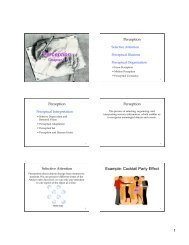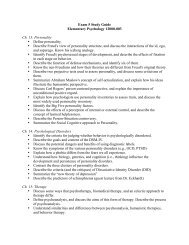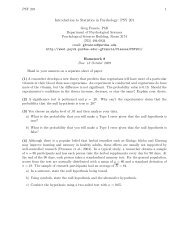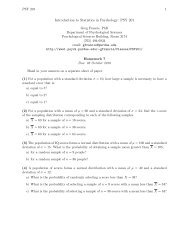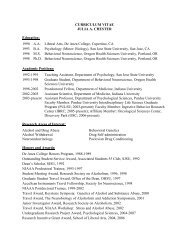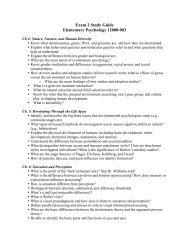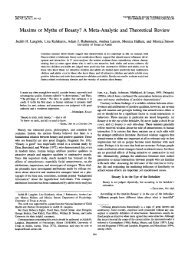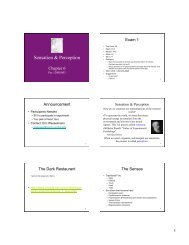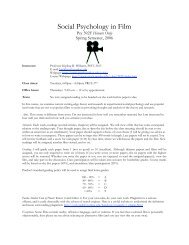Introduction to Cognitive Psychology - Department of Psychological ...
Introduction to Cognitive Psychology - Department of Psychological ...
Introduction to Cognitive Psychology - Department of Psychological ...
You also want an ePaper? Increase the reach of your titles
YUMPU automatically turns print PDFs into web optimized ePapers that Google loves.
Pr<strong>of</strong>essor Greg Francis 8/15/12BabiesBabies hear all phonemes, even ones theirparents cannot distinguishBabies, even newborns, do show a preferencefor what will become their native <strong>to</strong>ngue occurs because they hear mothers voice while in thewombMostly prefer the melody, stress, timing French infants like French and Italian equally well playing language backwards keeps many consonantsbut dis<strong>to</strong>rts melody (babies are not interested)Language developmentBetween 5-7 months, babies start making sounds clicks, hums, hisses, smacks,…Between 7-8 months babies start babbling insyllables ba-ba-ba-ba-ba neh-neh-neh da-da-da-da-daPurdue UniversityPurdue UniversityBabblingBabbling sounds are the same in all languages patterns are common across languagesBy the end <strong>of</strong> the first year babies combine syllables<strong>to</strong> sound like words neh-nee da-dee meh-nehBabbling is important children who do not babble <strong>of</strong>ten show slower speechdevelopment deaf children babble with hands, if parents use signlanguagePurdue UniversityBabblingBabbling teaches child how sequences <strong>of</strong> musclecombinations lead <strong>to</strong> different sounds necessary <strong>to</strong> produce speechBy about 10 months babies learn the sounds <strong>of</strong> theirnative <strong>to</strong>ngue they can no longer distinguish phonemes that are not part <strong>of</strong>the language Part <strong>of</strong> learning is forgetting!Purdue UniversityLanguage stagesNearly all children learn language in stages 1) Cooing (first several months) 2) Babbling (~6 months) 3) One word utterances (~1 year) 4) Two-word utterances and telegraphic speech(1-3 years) 5) Basic adult sequences with grammar(~4 years)The rate <strong>of</strong> learning varies substantiallyPurdue UniversityLearning wordsChildren learn words with ridiculous easeAn average 6 year old knows 13,000 words learned one new word every two waking hours this is without knowing how <strong>to</strong> read!The average high school graduate knowsabout 60,000 different words (not countingcompound words and such) means that in 17 years <strong>of</strong> life (not counting the firs<strong>to</strong>ne), they learned an average <strong>of</strong> 10 new wordseach day (one word every 90 waking minutes)Purdue UniversityPSY 200: Intro. <strong>to</strong> <strong>Cognitive</strong> <strong>Psychology</strong> 2



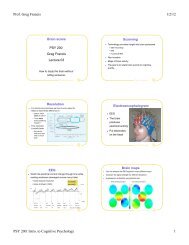

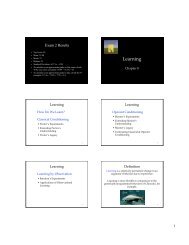
![Exam 4 Study Guide[1]](https://img.yumpu.com/45196739/1/190x245/exam-4-study-guide1.jpg?quality=85)
